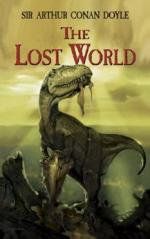Lord John Roxton has some points in common with Professor Summerlee, and others in which they are the very antithesis to each other. He is twenty years younger, but has something of the same spare, scraggy physique. As to his appearance, I have, as I recollect, described it in that portion of my narrative which I have left behind me in London. He is exceedingly neat and prim in his ways, dresses always with great care in white drill suits and high brown mosquito-boots, and shaves at least once a day. Like most men of action, he is laconic in speech, and sinks readily into his own thoughts, but he is always quick to answer a question or join in a conversation, talking in a queer, jerky, half-humorous fashion. His knowledge of the world, and very especially of South America, is surprising, and he has a whole-hearted belief in the possibilities of our journey which is not to be dashed by the sneers of Professor Summerlee. He has a gentle voice and a quiet manner, but behind his twinkling blue eyes there lurks a capacity for furious wrath and implacable resolution, the more dangerous because they are held in leash. He spoke little of his own exploits in Brazil and Peru, but it was a revelation to me to find the excitement which was caused by his presence among the riverine natives, who looked upon him as their champion and protector. The exploits of the Red Chief, as they called him, had become legends among them, but the real facts, as far as I could learn them, were amazing enough.
These were that Lord John had found himself some years before in that no-man’s-land which is formed by the half-defined frontiers between Peru, Brazil, and Columbia. In this great district the wild rubber tree flourishes, and has become, as in the Congo, a curse to the natives which can only be compared to their forced labor under the Spaniards upon the old silver mines of Darien. A handful of villainous half-breeds dominated the country, armed such Indians as would support them, and turned the rest into slaves, terrorizing them with the most inhuman tortures in order to force them to gather the india-rubber, which was then floated down the river to Para. Lord John Roxton expostulated on behalf of the wretched victims, and received nothing but threats and insults for his pains. He then formally declared war against Pedro Lopez, the leader of the slave-drivers, enrolled a band of runaway slaves in his service, armed them, and conducted a campaign, which ended by his killing with his own hands the notorious half-breed and breaking down the system which he represented.




